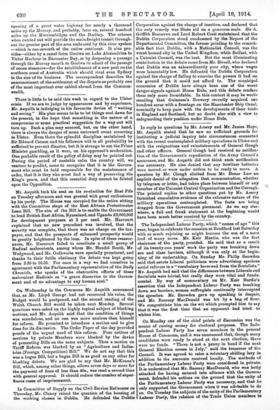In Committee of Supply on the Civil Service Estimates on
Thursday, Mr. Clancy raised the question of the housing of the working classes in Dublin. He defended the Dublin
Corporation against the charge of inaction, and declared that the only remedy was State aid on a generous scale. Sir A. Griffith Boscawen and Lord Robert Cecil maintained that the Dublin Corporation stood condemned by the Report of the Departmental Committee, the former pointing to the remark- able fact that Dublin, with a Nationalist Council, was the worst housed city in the United Kingdom, while Belfast, with a Unionist Council, was the best. But the most illuminating contribution to the debate came from Mr. Birrell, who declared that Dublin was an extraordinarily poor city, where wages were lamentably low. He defended the Dublin Corporation against the charge of failing to exercise the powers it had on the ground that it could not afford to. The municipal economics of Dublin have always been one of the worst danger-signals agiiinst Home Ride, and this debate renders them only more formidable. In this context it may be worth recalling that Guinness's Brewery recently acquired one hundred acres with a frontage on the Manchester Ship Canal, nominally to keep pace with the developments of their trade in England and Scotland, but no doubt also with a view to safeguarding their position under Home Rule.










































 Previous page
Previous page